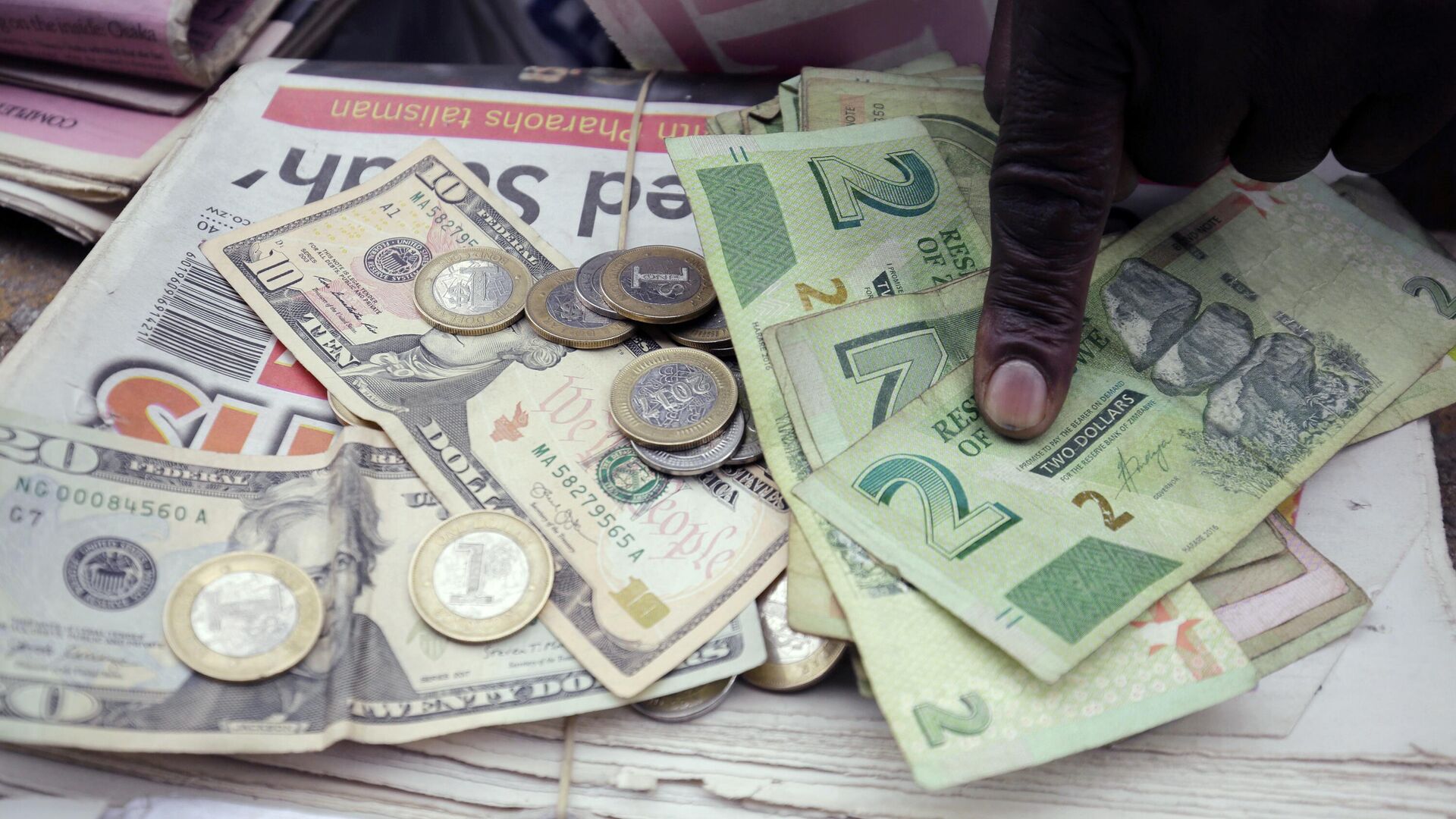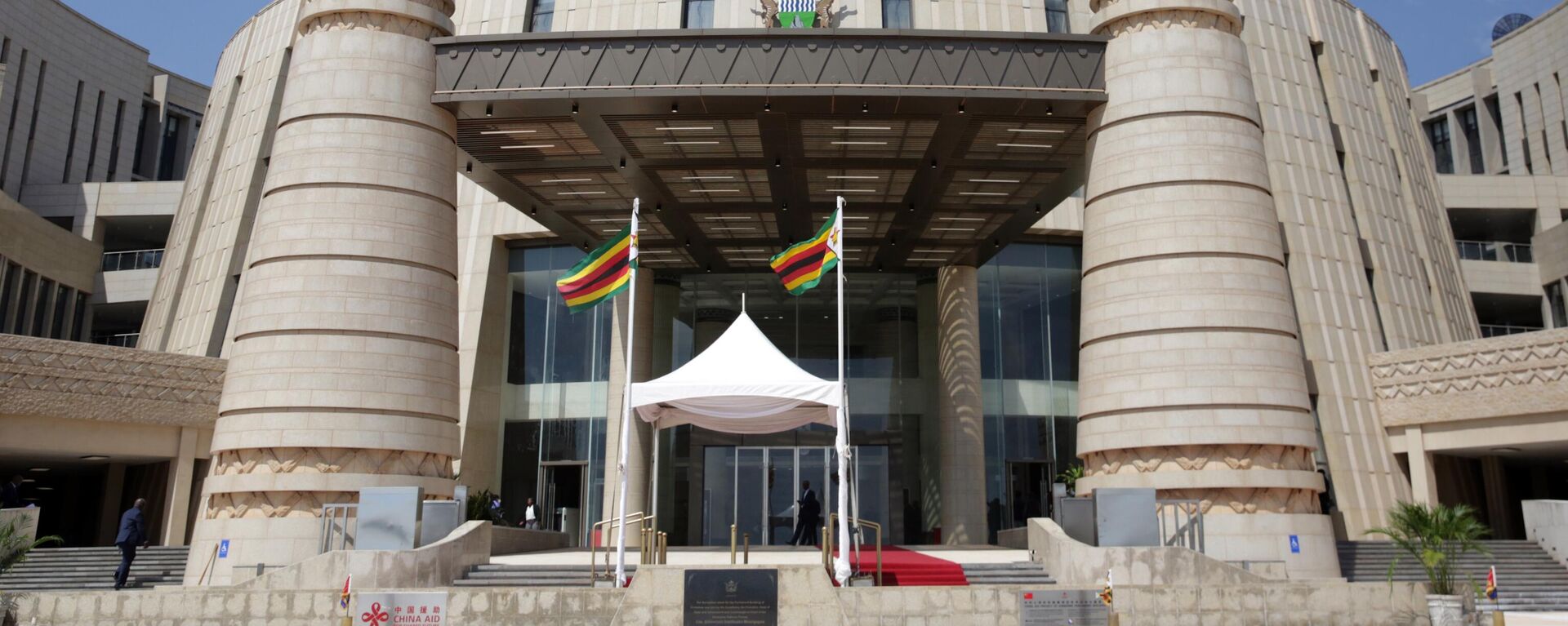https://en.sputniknews.africa/20230617/zimbabwean-president-bars-central-bank-from-borrowing-foreign-currency-1059992491.html
Zimbabwean President Bars Central Bank From Borrowing Foreign Currency
Zimbabwean President Bars Central Bank From Borrowing Foreign Currency
Sputnik Africa
In a bid to curb the national currency's decline and tame inflation, the government announced a series of reforms last month that included transferring some... 17.06.2023, Sputnik Africa
2023-06-17T17:26+0200
2023-06-17T17:26+0200
2023-06-17T17:26+0200
sub-saharan africa
southern africa
zimbabwe
central bank
emmerson mnangagwa
currency
alternative currency
government
https://cdn1.img.sputniknews.africa/img/07e7/06/11/1059992938_0:156:3000:1844_1920x0_80_0_0_7ba0ee665f321fd48e4c8dcf983f6024.jpg
President Emmerson Mnangagwa has directed Zimbabwe's central bank to stop foreign currency borrowing to help fight currency depreciation. Previously, the Reserve Bank of Zimbabwe used to borrow from regional banks in order to fund imports of fuel, fertilizers, and other basic goods. However, some analysts suggest that the central bank was exacerbating the raging currency crisis by borrowing foreign currency without parliamentary oversight.Currently, the country is battling with surging inflation, while the Zimdollar has weakened by over 80% since the beginning of the year. The country's website monitoring exchange rates showed that the local currency has plummeted in value by almost 60% this month alone. In May, in an attempt to stop the currency from sinking, the Zimbabwean government introduced a series of reforms that included full withholding of domestic foreign exchange earnings and the acceptance of all foreign loans by the Ministry of Finance and Economic Development, instead of the central bank. According to the country's Finance Minister Mthuli Ncube, Zimbabwe initiated these reforms in order to stabilize its currency, which is facing "enormous pressure" as domestic inflation is triggered by demand for US dollars.As of now, the Southern African country is experiencing various economic hardships, largely associated with the sanctions imposed on the nation at the beginning of the century, including hyperinflation, high unemployment and a shortage of basic goods.The country's authorities are making efforts to resolve these issues. In particular, to enhance the sourcing of basic goods, the government abolished the requirement for import licenses and allowed all basic goods to come into the country without import duties and taxes.
https://en.sputniknews.africa/20230512/zimbabwe-moves-to-stabilize-local-currency-under-enormous-pressure-1059197229.html
southern africa
zimbabwe
Sputnik Africa
feedback@sputniknews.com
+74956456601
MIA „Rossiya Segodnya“
2023
News
en_EN
Sputnik Africa
feedback@sputniknews.com
+74956456601
MIA „Rossiya Segodnya“
Sputnik Africa
feedback@sputniknews.com
+74956456601
MIA „Rossiya Segodnya“
southern africa, zimbabwe, central bank, emmerson mnangagwa, currency, alternative currency, government
southern africa, zimbabwe, central bank, emmerson mnangagwa, currency, alternative currency, government
Zimbabwean President Bars Central Bank From Borrowing Foreign Currency
In a bid to curb the national currency's decline and tame inflation, the government announced a series of reforms last month that included transferring some functions of the central bank, known as the Reserve Bank of Zimbabwe, to the Finance Ministry.
President Emmerson Mnangagwa has directed Zimbabwe's central bank to stop foreign currency borrowing to help fight currency
depreciation.
"The [central] bank shall only borrow foreign currency on behalf of the state at the instance of the [finance] minister and not on its own behalf," Mnangagwa is quoted as saying by media.
Previously, the Reserve Bank of Zimbabwe used to borrow from regional banks in order to fund imports of fuel, fertilizers, and other basic goods. However, some analysts suggest that the central bank was exacerbating the raging currency crisis by borrowing foreign currency without parliamentary oversight.
Currently, the country is battling with surging inflation, while the Zimdollar has weakened by over 80% since the beginning of the year. The country's website monitoring exchange rates showed that the local
currency has plummeted in value by almost 60% this month alone.
In May, in an attempt to stop the currency from sinking, the Zimbabwean government
introduced a series of reforms that included full withholding of domestic foreign exchange earnings and the acceptance of all foreign loans by the Ministry of Finance and Economic Development, instead of the central bank.
According to the country's Finance Minister Mthuli Ncube, Zimbabwe initiated these reforms in order to stabilize its currency, which is facing "enormous pressure" as domestic inflation is triggered by demand for US dollars.
As of now, the Southern African country is experiencing various economic hardships, largely associated with the
sanctions imposed on the nation at the beginning of the century, including hyperinflation, high unemployment and a shortage of basic
goods.
The country's authorities are making efforts to resolve these issues. In particular, to enhance the sourcing of basic goods, the government abolished the requirement for import licenses and allowed all basic goods to come into the country without import duties and taxes.


